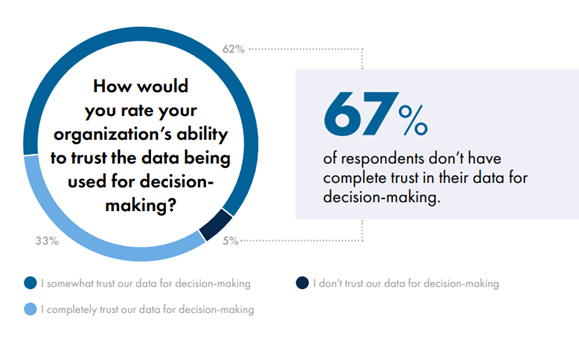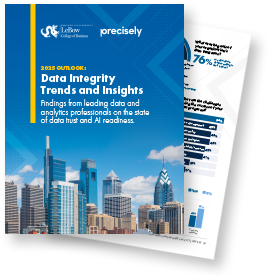
What is Data Integrity?

Key Takeaways:
- Data integrity is achieved when data has maximum accuracy, consistency, and context – giving you the power to trust your data and make better business decisions.
- The journey to trusting your data can be challenging, but you can more easily and effectively build data integrity when the core capabilities you need work together.
- Data integrity continues to grow in importance, especially if you aim to use your data for AI, automation, and other critical business initiatives.

For impactful data-driven decision-making, trust is everything. Specifically, trust in your data.
But data is complicated. And while 76% of organizations say data-driven decision-making is a top goal for their data programs, 67% still don’t completely trust the data they rely on for these decisions.
When data is difficult to find, flawed, or misunderstood, it disrupts your business. Decisions are made on instinct alone or not at all – destroying value. That’s why you need trusted data – and to trust your data, it must have data integrity.
What exactly is data integrity? Many proposed definitions focus on data quality or its technical aspects, but you need to approach data integrity from a broader perspective.
What is Data Integrity?
Data integrity is achieved when data has maximum accuracy, consistency, and real-world context; it’s available whenever and wherever you need it, so you can make fast, confident decisions. It gives you the power to:
- add, grow, and retain customers
- move quickly and reduce costs
- manage risk and compliance
The accuracy and consistency of your data are crucial, but data integrity also means having rich context. In the case of your customer data, for example, understanding the accurate and complete locations where your customers live, work, and play, and how those locations are associated with demographics and lifestyle factors, helps you understand purchasing behavior.
Data integrity also requires the entire tapestry of data sources throughout your organization to be woven together so that your business users can develop a complete and meaningful picture of the things that matter most to them. That requires data integration to unlock the information stored in siloed systems.
Data quality issues often present a significant challenge to data integrity. Inaccurate, non-standardized, and incomplete data diminishes the potential of business analytics, artificial intelligence, and machine learning, even in a best-case scenario. In the worst cases, it can lead to bad business decisions that result in outcomes like poor investments, regulatory fines, and damage to your brand’s reputation. A sound data integrity strategy includes data quality solutions that:
- standardize and validate
- identify gaps or discrepancies
- deploy data observability capabilities to uncover data anomalies and trigger workflows and processes to correct those errors at scale
Finally, data integrity requires a practical framework for data governance to oversee all other aspects of integrity and ensure the organization complies with best practices for security and privacy and all necessary regulations.
Data integrity is more important than ever, especially as many businesses aim to use their data for artificial intelligence (AI), automation, and other critical business initiatives. Next, we’ll take a closer look at your data’s role in AI success.
2025 Outlook: Essential Data Integrity Insights
What’s trending in trusted data and AI readiness for 2025? The results are in!

Why Does Data Integrity Matter for AI Success?
What does AI-ready data look like? Think of it this way: without trusted data, there’s no trusted AI. Trusted AI data needs data integrity.
Without accurate, consistent, and contextualized data, even the most advanced AI systems can falter, leading to:
- biased outputs
- untrustworthy results
- lack of contextual relevance
- overall loss of trust in your AI
Whatever your use cases, you can’t take these risks lightly. Your investments will only pay off if your AI systems are built on a foundation of trusted data.
And to achieve that foundation, you first need to tackle any outstanding data integrity challenges, like those we’ve covered around data integration, quality, governance, and more.
It’s time to take steps to achieve data that minimizes bias, increases accuracy, and provides the necessary context for nuanced, relevant outcomes.
What’s the Difference between Data Integrity and Data Quality?
Many people confuse data integrity with data quality, often using the two terms interchangeably. In the traditional sense, data integrity is an aspect of data quality – but at Precisely, we believe that data integrity goes beyond data quality to mean so much more.
There are some important differences between data integrity and data quality that you need to know:
Data quality is an essential subset of data integrity, that refers to the reliability of data. For data to be considered high-quality, it must be:
- complete (not missing essential elements)
- unique (free of redundant or extraneous entries)
- valid (conforming to the syntax and structure defined by the business requirements)
- timely (sufficiently up-to-date for its intended use)
- consistent (represented in a standard way throughout the dataset)
Data integrity goes beyond data quality, requiring that data be complete, accurate, consistent, and in context. Data integrity is what makes the data actually useful to your various use cases.
Start Your Journey to Data Integrity with Business Value and the Right Tools
Ultimately, data has the potential to be your organization’s most valuable asset – but you need to have that basis of trust.
Data integrity isn’t a binary all-or-nothing proposition, and it’s a journey that will look very different from one organization to another. There is no one-size-fits-all approach.
The data integrity journey often begins with initiatives around specific projects, where the impact of data integrity efforts is readily visible, and its results deliver business value across many different teams across your organization.
As an example, let’s say you set out to improve the customer experience. The process might look like this:
- Begin with breaking down the silos between mainframe systems, digital marketing automation, and CRM, and ensuring that all systems using data are kept current with changes to transactional systems.
- That effort may reveal data quality issues that must be addressed, reconciling data discrepancies, identifying anomalies, and proactively managing quality going forward.
- Finally, the project team may identify a need for external datasets to enrich your internal customer data with demographic, lifestyle, and geospatial information – all of which provide essential context.
Or that initiative may begin with the need to establish policies for safeguarding customer information, controlling unauthorized access to data, and documenting compliance with all relevant privacy and data sovereignty regulations. Data governance would enable you to answer essential questions about your data usage, impact, and lineage.
And a data governance initiative may lead you to identify and address data quality issues – and so the data integrity journey continues, increasing confidence in data across your organization and producing more accurate, informed decisions and reporting.
Starting Your Data Integrity Journey with the Right Tools
The trusted data journey can feel overwhelming if you struggle with challenges like the higher costs of managing multiple solutions, productivity setbacks from disjointed user experiences, or the risk created by inconsistent security practices used by point products.
The good news? It doesn’t need to be that way. You can more easily and effectively build data integrity when the core capabilities you need work together – and our Precisely Data Integrity Suite does just that.
With the Suite, you build trust in your data through market-leading data integration, data observability, data governance, data quality, geo addressing, spatial analytics, and data enrichment capabilities – delivering on the data integrity promise of accurate, consistent, contextualized data, whether your data lives on-premises, in the cloud, or in hybrid environments.
The Suite’s Data Integrity Foundation makes it all possible. It equips you with the building blocks for better data. It connects and accelerates all Data Integrity Suite capabilities, allowing you to perform the fundamentals like securely accessing your data, cataloging and understanding it, and intelligently designing and running processes to improve it.
In other words, the Suite provides one place to easily address all aspects of data integrity.
Want more data integrity insights for your strategy, straight from your peers? Read the 2025 Outlook: Essential Data Integrity Insights report, published in partnership between Precisely and the Center for Applied AI and Business Analytics at Drexel University’s LeBow College of Business. You’ll discover what 565 data and analytics professionals had to say about their organizations’ data strategies, priorities, challenges and the state of AI readiness.
___________________________________________________________
Frequently Asked Questions:
What are the main factors that cause an organizations data to lack data integrity?
Most organizations struggle with data quality. According to the 2025 Outlook: Essential Data Integrity Insights report, data quality is the top challenge impacting data integrity, cited by 64% of data and analytics professionals. And yet, most organizations are grappling with broader issues, including the lack of contextual richness in their data. Location intelligence and data enrichment, for example, provide the raw materials for far richer and more valuable data-driven insights.
How does data integrity impact business outcomes?
Data with integrity is trusted because it provides maximum accuracy, consistency, and context. It is available whenever and wherever it’s needed, empowering organizations to make fast, confident decisions; add, grow, and retain customers; move quickly; reduce costs; and manage risk and compliance.
What’s the best approach for businesses looking to improve their data integrity?
Every company’s path to data integrity is unique – there is no singular starting point. The best approach, especially if you’re unsure where to start, would be to engage with our Consulting Services team. They’re experienced data leaders who will work with you to align data strategy and execution plans to your business objectives.
What tools does Precisely offer to help organizations achieve and maintain data integrity?
The Precisely Data Integrity Suite is an innovative, modular, interoperable, and scalable solution. It enables each organization to address its own unique requirements with a holistic set of seven cloud services that work seamlessly together: Data Integration, Data Observability, Data Governance, Data Quality, Geo Addressing, Spatial Analytics, and Data Enrichment. Together, these services are connected by one powerful data integrity foundation that accelerates your data integrity journey and provides the confidence you need for fast decision-making.


